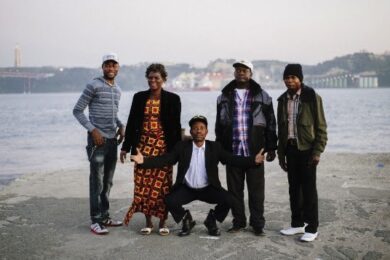"Music for lonely cowgirls" is George Pringle’s rather fabulous description of her second album. Three years in the gestation, Golfo Dei Poeti, (the colloquial name of La Spezia in northern Italy – "The Gulf Of Poets) is a remarkable leap forward from her debut Salon des Refusés. As you can already tell, dear reader, anyone without a taste for densely allusive journeys through European culture and art (or "pretension" if you must, you dreadful philistine) can safely bail out now.
Your loss if you do however, as Pringle has crafted a gorgeously luminescent slab of left-field pop, by largely ditching her previous spoken-word style in favour of, well, songs and singing. And in another 180 degree turn, her previous tendency to writerly wordiness has given way to a pared-down, mantra-like lyrical approach.
This is not to imply that the writing is any the lesser; quite the opposite. The words-to-impact ratio has gone through the roof. If Pringle’s first album was like reading someone else’s diary – with all the intimacy and unease that implies – this is more like looking through someone else’s photographs. The narratives are accordingly more vague and fragmented, but the momentary details are vividly sharp.
It’s not exactly a concept album, but the songs seem mostly written to make sense in the context of each other. The Gulf Of Poets is sketched as an adult Land Of Oz, breathlessly described in the hypnotic, giddying title track’s sole repeated lyric as "Palm trees / electric dreams / the sea looks green". The poison in the Bellini, however, is that this is really a record about London, and about dreaming of escape from the "rat-piss stink city" described in ‘Diamond Life’. "Why don’t you come down and see me / in the real life breathing city?" asks a robotic-sounding Pringle over sparse sub bass tones.
This duality runs through the whole album. Opener ‘London, My Lonely Smoke Ring’ is almost harrowingly stark, a solo vocal over mournful organ backing. With bracing valleys of total silence where choruses should be, and a sudden, sheer cliff face of synth noise in the final third, it’s an astonishing, perverse way to open an album. Then second track ‘Piazza Principle’ is a seemingly straightforward romantic pop song about waiting to meet a lover at the railway station in Genova (featuring the hilariously deadpan refrain "Strike a pose / by the coast". And on it goes, a series of alternating sketches of melancholy and ecstasy (sometimes within a single song).
Sonically, this album is lo-fi in the only truly righteous sense; a lack of resources has not been allowed to stand in its way. There is no trace of here of lo-fi as an aspiration. And despite the lack of big budget studio sheen, there is something irresistibly luxurious and warm about its synthetic, frequently drumless textures. ‘Sand Banks’ is a bed of curiously static deep bass notes; ‘Fanclub’ a hazy dub sprawl with wordless vocals; ‘Real As Sound’ a minimalist, half-awake pulse building into a taut electro track.
At a time when even the biggest acts are constantly available and rendered mundane by relentless Twittering of tour bus photos and other such behind-the-curtain tediousness, Pringle has achieved the oddest thing. Despite her three-year absence, generally aloof approach to the business of selling records, and increasingly oblique lyrical style, everything about this record, from the songs to the hand-made CD packaging has the feel of a directly personal communiqué.
Gulfo Dei Poeti is just as strange as self-released bedroom music should be, yet as accessible and beguiling as it so rarely is. A shorter holiday next time, please George.



